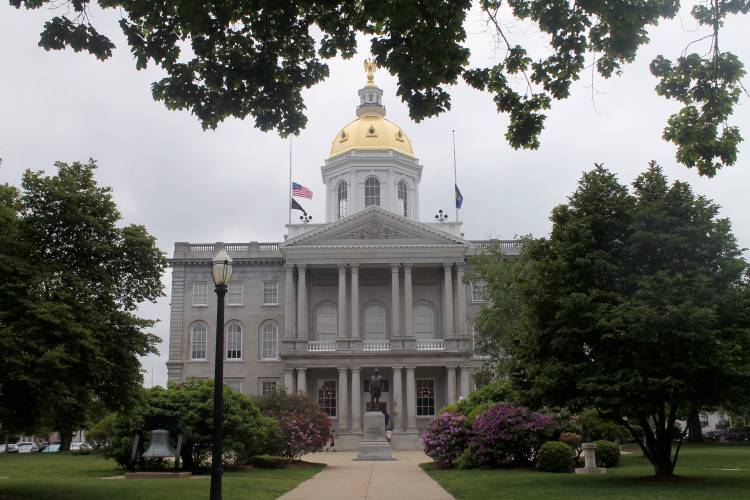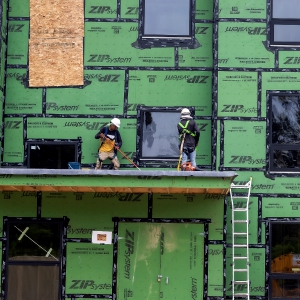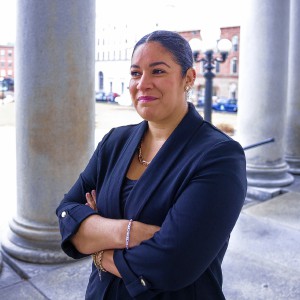NH Republicans resurrect efforts for a ‘parental bill of rights;’ gender reporting requirements not yet included

New Hampshire State House Holly Ramer/AP photo, file
| Published: 01-04-2025 4:00 PM |
Anthony Foote has challenged the Bow School District twice in the past two years – once over a book he believed was inappropriate for schools, and now in a lawsuit over his pink armband protest at a girls’ soccer game.
In 2025, a new law could cement what Foote believes are his fundamental rights as a parent: the ability to decide what values are taught to his children, and the right to know what’s going on in his child’s life.
New Hampshire House Republicans plan to revive an effort this year to enact what they call a “parental bill of rights,” which they say supports the autonomy of parents and outlines their rights over public school districts. Previous versions of the bill drew backlash from advocates who said it jeopardized the privacy of LGBTQ students.
Now with an expanded conservative majority, House Bill 10 – sponsored by House Speaker Sherman Packard and other high-ranking Republicans – faces a more favorable legislative landscape than the same effort did in 2023, when it failed in the House, 195-190. The incoming governor, Kelly Ayotte, campaigned on a promise to pass a parental bill of rights. Packard did not participate in an interview for this story after multiple requests.
Foote supports the spirit of the bill but still expressed surprise that parental rights need to be written into the law. He said they’re a “God-given gift” and should be covered by the Constitution, which outlines many rights for parents.
“I don’t need a law for that,” Foote said of the bill’s provision that parents have the right to direct the upbringing and education of their children. “It’s sad that we have to get to that point where we put the legal system into defining what parents are supposed to do.”
Support for more parental involvement and power in education has swept the country, with more and more states enacting parental bills of rights or laws to that effect.
Some parents have grown to distrust the public school system, thinking teachers and administrators are indoctrinating students with liberal bias and withholding information from parents. In some local schools, parents have challenged the content of books and questioned policies relating to LGBTQ+ students. On the state level, New Hampshire has also created an avenue to report teachers to the state who are believed to be delivering biased lessons on history, race, gender and sexuality.
Article continues after...
Yesterday's Most Read Articles
 With Steeplegate still held up in court, city privately debates public investment
With Steeplegate still held up in court, city privately debates public investment
 Sudden pile of trash near Exit 13 on Manchester Street in Concord considered ‘illegal dumping’
Sudden pile of trash near Exit 13 on Manchester Street in Concord considered ‘illegal dumping’
 Mullet madness: Young man who died in motorcycle accident remembered at local fundraiser
Mullet madness: Young man who died in motorcycle accident remembered at local fundraiser
 OSHA investigates Pittsfield partial building collapse
OSHA investigates Pittsfield partial building collapse
 ‘Peace of mind’: As New Hampshire nixes car inspections, some Concord residents still plan to get them
‘Peace of mind’: As New Hampshire nixes car inspections, some Concord residents still plan to get them
For Foote, a heavily involved parent in the Bow School District, the line between parenting and education is clear. As a parent, he said, he provides for his children and instills moral values and beliefs. He expects schools to stick to what he considers the basic tenets of education – topics like science, math and English – but “they don’t need to get into the family.”
“I think schools are beginning to overstep what their duties are as educators,” Foote said. “They’re crossing into parental zones, which makes no sense to me.”
The bill would compel every public school district to write a policy to “promote parental involvement in the public school system,” which must include procedures for parents to learn about and object to any part of the curriculum or learning materials used in the classroom. It would also allow parents to withdraw their children from instruction involving sex education, AIDS and sexuality.
Salem Rep. Jason Osborne, the House majority leader and a cosponsor on the bill, said it’s all about transparency.
“Parents need to know what is happening to their children in school, period,” Osborne said, “Whether it’s curriculum or medical treatments or counseling, parents need to know.”
Foote said in Bow, parents are notified about instruction on sensitive topics before they happen. He supports the idea of parents being able to withdraw their children from that class if necessary, especially for discussions of “gender ideology,” he said.
The bill notably leaves out school library books, which have become a hot topic as more states and school boards enact book bans. New Hampshire doesn’t currently have a law on this, but Tuftonboro Rep. Glenn Cordelli has filed a bill request that would prohibit schools from having any materials deemed as containing “obscene or harmful sexual materials.” His previous attempts to pass similar legislation have failed.
The first draft of the parental bill of rights is largely similar to its previous iteration, though its sponsors say it’s a starting point and likely to see some amendments during the legislative session. Wilton Republican Jim Kofalt, who’s an advisor to Packard and another cosponsor on the bill, said they’re considering changes to “strengthen parental rights beyond what we had on the table last year.”
As it’s written now, Chris Erchull, an attorney and lobbyist for GLBTQ Legal Advocates and Defenders, thinks the bill is better than previous iterations he’s lobbied against thanks to one important omission: The bill doesn’t mention or specify anything about transgender students or gender identity.
“LGBTQ students have been targeted in previous parental rights legislation, and that’s just not apparent here,” Erchull said. “I’m really pleased to see that LGBTQ students haven’t been the target of this bill.”
On the other hand, he said, the language is vague and could produce a chilling effect. The proposed law wouldn’t allow any violations by school personnel except for a compelling state interest, which in this case, the bill defines as proof “beyond reasonable doubt that the action taken either prevented direct harm to the child by the imminent threat or was in direct response to harm inflicted on the child by a parent.”
If a school administrator isn’t sure whether the law applies to a certain situation, they’ll tend to err on the side of caution, “especially when the stakes are really high,” Erchull said.
The American Civil Liberties Union of New Hampshire took a more staunch stance against the bill and noted that the Legislature has sought “vague and punitive bills that target Granite State educators.”
“This bill … would create censorship, criminalize teachers, and negatively impact LGBTQ+ students – and it has no place in New Hampshire,” policy advocate Court Reed said in a statement.
Erchull said he’s still concerned about potential harm to LGBTQ students and worries the new law could put school personnel, like guidance counselors, in a position where they can’t look out for all students.
“Most parents only want what’s best for their children and would never seek to harm them,” Erchull said. “That said, we know that there are some rare but very serious exceptions to that rule … and LGBTQ young people are disproportionately impacted by child abuse.”
New Hampshire law already requires any adult who suspects child abuse or neglect to report it to the state.
For now, the bill gives parents access to their children’s school and medical records but doesn’t mention anything specific about gender reporting requirements. However, it does say school employees shouldn’t withhold “important information” about a child’s health or well-being. And, it bars any school employee from attempting to “encourage or coerce” a student to withhold information from their parents.
The debate on parental rights comes down to whether and how public schools should be involved in family issues. As parental rights advocates argue teachers should stay out of conversations around sex, gender, religion and moral values, opponents maintain that having schools report everything back to parents could jeopardize student safety and alienate vulnerable children .
Foote said if teachers have a question or a concern, they should take it up with the adult parent, not the minor student.
“They’re sacred,” Foote said of children. “They’re supposed to be protected and shielded from the adult world as long as possible. If I had a teacher asking my daughter if she thought she was a boy, I would be beside myself.”
Erchull, on the other hand, believes parental rights laws that require teachers to out LGBTQ students to their families – which could still be added to this bill – gives government a greater role in family issues.
“It’s forcing the teacher in the middle of family affairs that really should be about conversations that happen between young people and their parents,” he said.
Charlotte Matherly is the statehouse reporter for the Concord Monitor and Monadnock Ledger-Transcript in partnership with Report for America. Follow her on X at @charmatherly, subscribe to her Capital Beat newsletter and send her an email at cmatherly@cmonitor.com.







 New Hampshire school phone ban could be among strictest in the country
New Hampshire school phone ban could be among strictest in the country Concord became a Housing Champion. Now, state lawmakers could eliminate the funding.
Concord became a Housing Champion. Now, state lawmakers could eliminate the funding. ‘A wild accusation’: House votes to nix Child Advocate after Rep. suggests legislative interference
‘A wild accusation’: House votes to nix Child Advocate after Rep. suggests legislative interference  Sununu decides he won’t run for Senate despite praise from Trump
Sununu decides he won’t run for Senate despite praise from Trump
